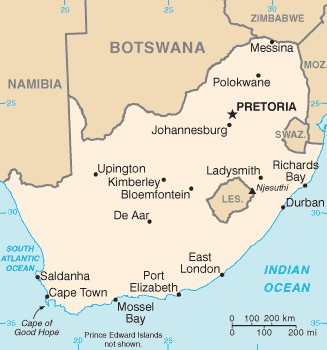I had the privilege these last few days to join a conversation between US and South African experts, here in Pretoria. Hosted by Pretoria University and the US Stanley Foundation, the discussion focused on how, and in what ways, the United States and South Africa might better collaborate on the challenges facing states – in the global economy and in international politics. With South Africa a member of the G20 there was a particular interest in understanding how South Africa might play a role in the new informal club of established powers and newly rising states.
This two-day dialogue was however off-the record so I will not comment on specific conversations. You can have a look at Stewart Patrick’s blog at CFR, The Internationalist (South Africa: Just Another BRIC in the Wall?) for his examination of the South African foreign policy trajectory. Stewart was one of about 6 of us from North America that found ourselves exploring with our South African colleagues from the University of Pretoria, a variety of think tanks and NGOs this most interesting bilateral relationship.
One aspect that emerged early in the conversation and remained a theme throughout was the limited understanding for the views and policies of the other side. Clearly more dialogue and discussion is necessary and should be encouraged – and for the record I will happy to volunteer for the task.
I must say at the outset that I gained little insight in how South Africa sees the G20. In fact there was rather limited discussion of this new global summitry institution. On the other hand there was much discussion of the importance of South Africa being admitted to the BRICS – though it was never expressed forthrightly what the BRICS were likely to achieve – and why therefore South Africa regarded joining as so important to it. It was evident, however, that the BRICS, according to the South African’s – was a caucus where the members were proponents for non-intervention – and that was likely to prove troublesome to the United States.
There were evident divergences in the foreign policy perspectives and priorities of the two countries. And there was also – and I would say more troubling – evident suspicions over the behaviors of each. Thus South Africans were quick to see US heavy-handedness and an eagerness to resort to force in most crises situations. There was great back and forth over whether the US and other allied actions in Libya had exceeded the UN resolution 1973 – and US quick dismissal of African Union efforts to mediate between the Libyan factions. Many of the South Africans thought so. South Africans expressed strong disapproval for the humanitarian intervention in Libya – some even suggesting that South Africans and other African states would be unlikely to resort again to the policy of humanitarian intervention – given the way that the Libyan mandate had been abused according to a number of South African participants.
There was a measure of dismay from the US experts at the reliance on non-intervention by South Africans in a variety of crises settings including Myanmar and more recently in Syria. US experts additionally expressed discontent over the South African approach to the crisis in Zimbabwe and the efforts to tamp down the crisis without stronger efforts to remove the authoritarian leader Mugabe.
So what lessons did I come away with in this encounter? Experts from both countries emphasized the heterogeneity of their societies, their pride in their democracies and their commitment to a rules-based international order. But there was a significant divergence in the way in which they approached achieving that order and a hesitancy in the character and actions of the other country.
South Africa continues to regard UN Security Council (UNSC) reform as vital; they continue to press for a permanent seat there. There was a growing sense from the South Africans that they could no longer count solidly on African support. And both group of experts remained pessimistic that any reform in the near term was at all likely – though South Africans urged greater efforts by the United States to secure reform. Both groups also acknowledged that continuing deadlock would erode the legitimacy and salience of the Council.
The South Africans underscored their country’s concern and actions in promoting peace in security on the African continent – in Libya, South Sudan, Zimbabwe, etc. They expressed annoyance at the failure of the US to acknowledge and support the efforts, especially of the African Union (AU), on the continent.
The conversation was a helpful effort in filling in some of the blanks in the relationship. But there is much to do to reduce the gap in understanding and modify the suspicions that each has for the efforts of the other in global governance.


